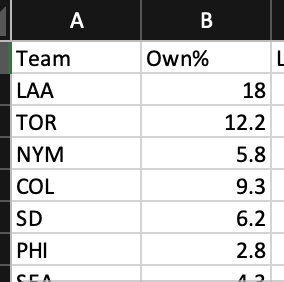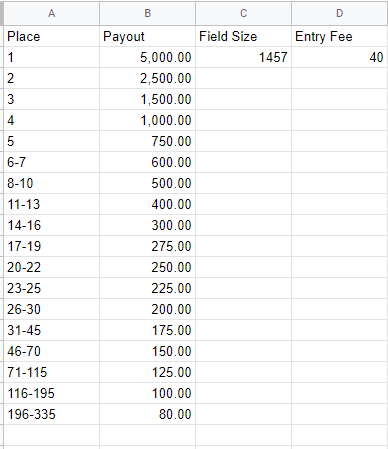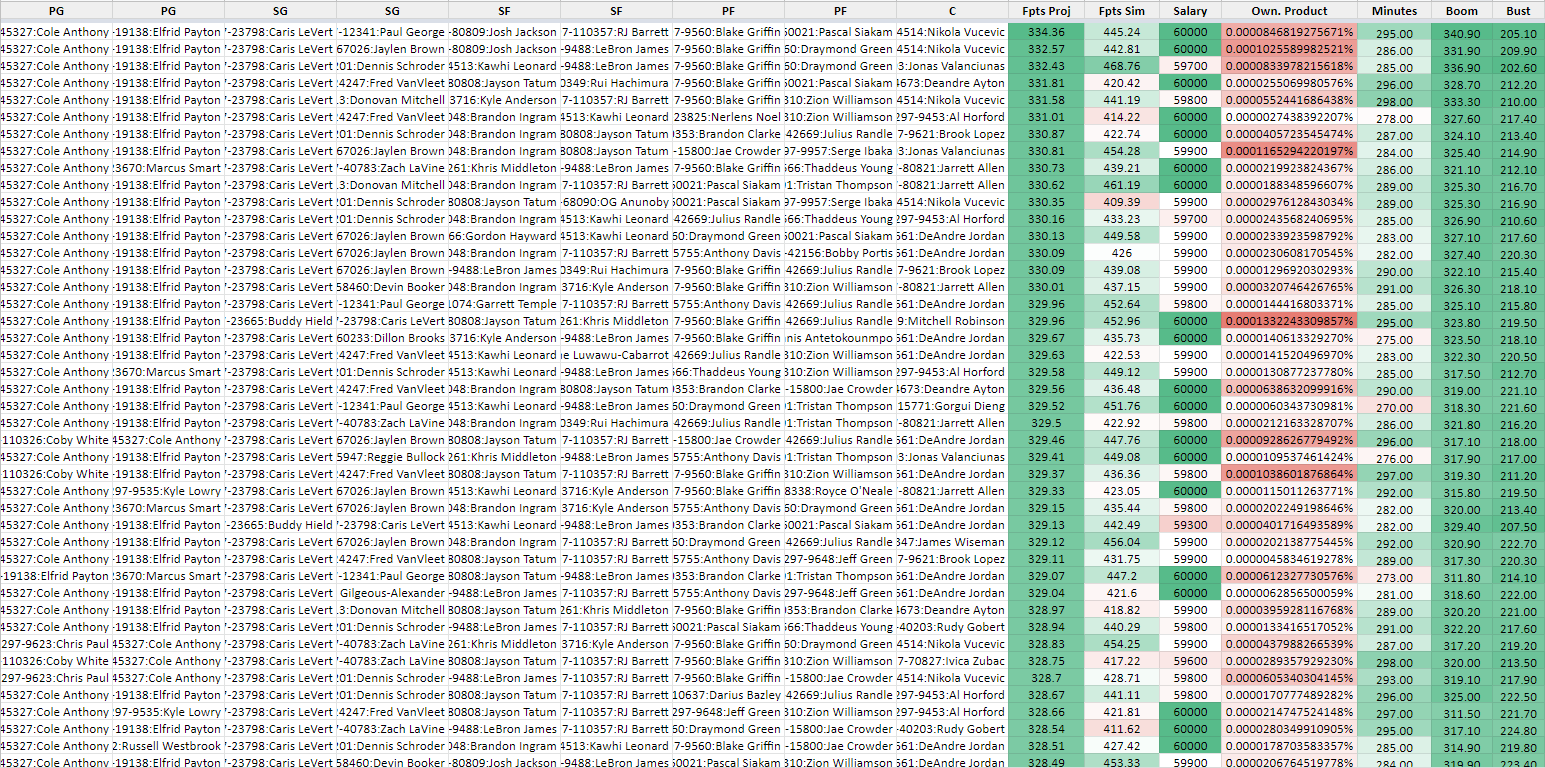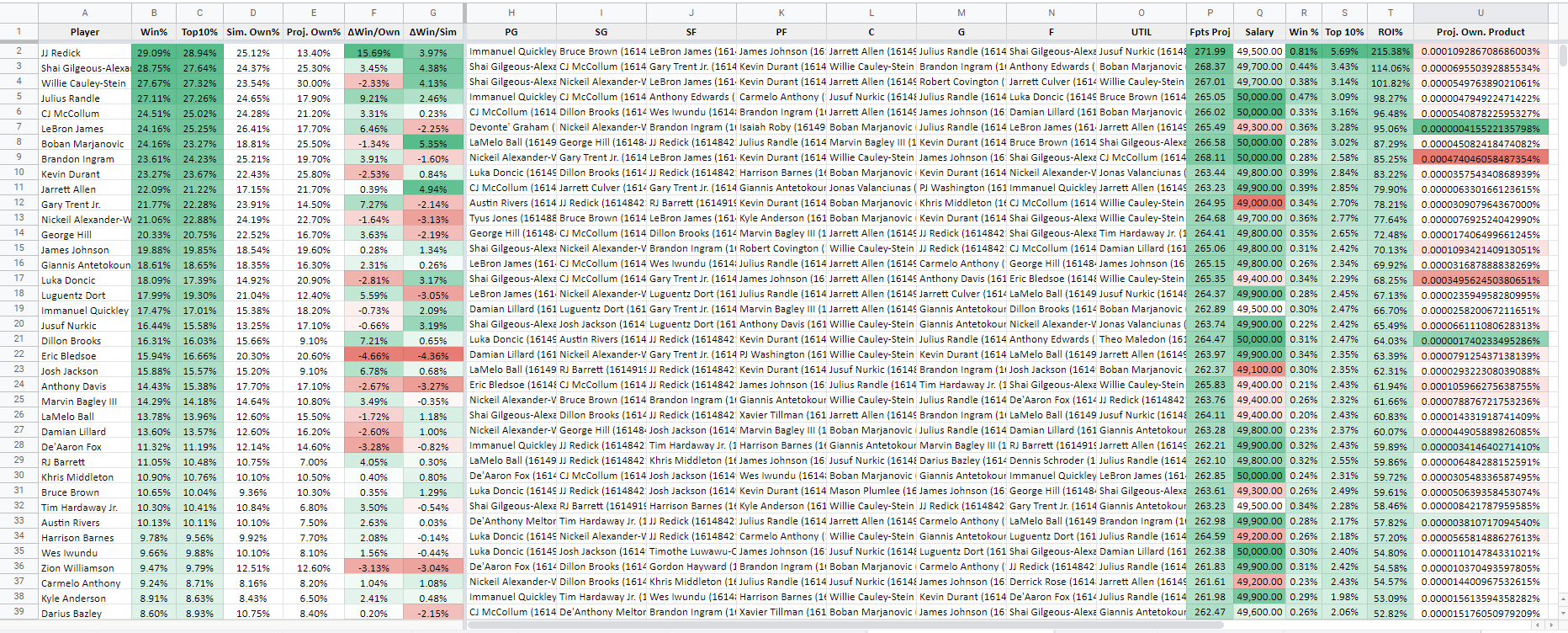Packaged in this repository is an MLB GPP Simulator for DraftKings (with FanDuel on the way), along with other tools you might find useful in helping you win your Cash games, Head-to-heads and Tournaments. You'll find installation and usage instructions below.
This tool was created in conjunction with @bjungwirth who is knowledgeable in both DFS game theory as well advanced python data science and data strucures. You can check him out on Twitter or read his blog.
If you're lazy and don't like reading, you can check this video which covers most everything listed below. Note that this video concerns our NBA-DFS-Tools repo, so treat the README as gospel.
- To run the tools, you will need to install python if you don't already have it. These tools were bult on Python >=3.8.2, and may be incompatible with outdated versions of Python.
- In addition to the base python installation, you will need the following packages:
- PuLP -
pip install pulp. This is the linear programming solver - the "optimizer" if you will. - timedelta -
pip install timedelta. This package makes it easy to interpret dates for late swaptimizing lineups. - pytz -
pip install pytz. Another helpful package for interpreting dates and late swaptimizing - numpy -
pip install numpy. This package makes data manipulation and handling matrices easier. - pandas -
pip install pandas. This package converts pythonic data structures (dicts, lists, etc) to more familiar tabular data structures.
- PuLP -
To install these tools, you may either clone this repository or download the repository as a ZIP file (see image below) and extract it to the directory of your choosing.
After you have cloned or downloaded the code base, you must import player contest data from DraftKings or FanDuel. Reference the screenshots below for your relative site. You will need to rename these files to player_ids.csv, and place into their relative directory (dk_data/ or fd_data/). These directories should be folders located in the same directory as src/ and output/, and will hold relevant data for each site.
After you have the player data, you must import data from your trusted DFS site, namely the projections, ownership, standard deviation, and field stacks (for MLB). Download them as CSV, and rename them to match the image below. These will go in either dk_data/ or fd_data/ depending on which data you downloaded.
Save stack ownership in the file team_stacks.csv with the columns "Team" and "Own%" where "Team" is the team abbreviation for each team (e.g. 'LAA') and "Own%" is what percentage of the field uses that stack.
To use the tools, you will need to open a windows console or powershell terminal in the same directory as this repository. To do this, go to the root directory and then navigate to File > Open Windows Powershell as seen below.
To run the tools, the generic usage template is as follows:
python .\main.py <site> <process> <num_lineups> <num_uniques>
Where:
<site> is:
dkfor DraftKings. Note for DraftKings, players are output in alphabetical order and must be re-ordered into their positions before uploading back to DK. Note for DraftKings, if you run into any KeyErrors on player names (e.g. Matthew Fitzpatrick vs Matt Fitzpatrick) you must also runpython .\name_change.pybefore any crunching/simulating, as some player names differ between projections and DraftKings's player datafdfor FanDuel. Note for FanDuel, you must also runpython .\name_change.pybefore any crunching, as some player names differ between projections and FanDuel's player data
<process> is:
-
optofor running optimal lineup crunches, with or without randomness -
simfor running GPP simulations-
Usage #1 allows you to run arbitrary simulations for any field size and number of iterations, without regards to a real contest structure. The usage for this is:
python .\main.py <site> sim <field_size> <num_iterations>, where<field_size>is the known entrant size,<num_iterations>is the number of times you wish to simulate the tournament. -
Usage #2 allows you to specify an actual DraftKings contest, which will dictate
<field_size>. You will specify the number of iterations, but specifying the contest allows the simulation to take ROI into account, since the payout structure and entry fee is known. The usage for this is:python .\main.py <site> sim cid <num_iterations> <match>. To execute this usage, you will need acontest_structure.csvfile in the structure of the image shown below. You can obtain this fairly quickly by opening up the contest details overlay and copy/pasting the prize payouts section into Excel or Google sheets, then usingCtrl+Hto get rid of 'st', 'nd', 'rd', 'th', etc...- Additionally, you may opt to upload lineups from a file rather than have them randomly generated/simulated. To specify this option, you will add
fileas a flag in your command like so:python .\main.py <site> sim cid file 10000. You must have an input file calledtournament_lineups.csvin the base input directory. This allows you to upload specifically-tailored lineups that you feel are more representative of your contest than the ones generated. It also has the added benefit of being much faster than generating lineups. For example, you may take the output of theoptoprocess, and rename the file totournament_lineups.csv, and use those as your input for thesimprocess. The simulator will now automatically generate the difference between the number of lineups in thetournament_lineups.csvfile and the<field_size>parameter from either thecontest_structure.csvor the shell prompt.
The
tournament_lineups.csvfile requires ten columns, one for each player in a (draftkings) lineup. Players can either have their full name or full name and player id in parentheses. - Additionally, you may opt to upload lineups from a file rather than have them randomly generated/simulated. To specify this option, you will add
-
-
sdfor running showdown crunches, with or without randomness
<num_lineups> is the number of lineups you want to generate when using the opto process.
<num_uniques> defines the number of players that must differ from one lineup to the next. NOTE - this is enforced after crunching, so 1000 lineups may be whittled down to 7-800 depending on this constraint. Enforcing this after crunching aids in the speed of crunching. Expect approximately 5-15% of lineups to be "culled" by this constraint and plan accordingly. The more players available to crunch, the lower this percentage will be.
For example, to generate 1000 lineups for DraftKings, with 3 uniques and randomness, I would execute the following:
python .\main.py dk opto 1000 3 with "randomness": X in config.json where X is a number between 0 and 100
The image below shows what the shell/terminal should look like when executing this. You may safely ignore the PuLP overwriting warning, as we must overwrite the linear programming objective with the updated random projections.
In the base directory, you will find sample.config.json, which has a few template options for you to limit players from teams, and make groups of players you want a limit on. This is just meant to show you how you structure rules in this optimizer. When you're ready, copy this file and rename it to config.json. Note that you cannot have comments in this file and it must be properly formatted. If you're on windows, be sure you are renaming the entire file to config.json and not config.json.json. This can happen if you don't have file name extensions visible. To fix this, in your windows file explorer, go to the "View" tab up top, and tick the box that says "File name extensions".
The structure for the config is as follows:
{
"projection_path": "projections.csv", // This is where projections are loaded from -- the required columns are "Name", "Salary", "Position", "Team" and "Fpts" ("Own%" and "StdDev" are optional but recommended)
"player_path": "player_ids.csv", // This is where player ids are loaded from -- this is the direct player ID export from DraftKings/Fanduel found on the contest or edit lineups page, no changes are required.
"contest_structure_path": "contest_structure.csv", // This is where GPP sim tournament structure is loaded from -- as seen above, the required columns are "Place", "Payout", "Field Size", "Entry Fee"
"team_stacks_path" : "team_stacks.csv", //This is where field ownership is of specific team stacks (minimum 4 players from the same team in a lineup). Required columns are "Team" (abbreviation) and "Own%"
"projection_minimum": 5,
"randomness": 100,
"primary_stack_min": 4, // the minimum number of players from a team stack to use in a primary stack
"primary_stack_max": 5, // the maximum number of players from a team stack to use in a primary stack
"secondary_stack_min": 3, // the minimum number of players from a team stack to use in a secondary stack
"secondary_stack_max": 4, // the maximum number of players from a team stack to use in a secondary stack
"primary_stack_teams": "NYY,ATL,SD,TEX", // the teams to use in primary stacks (use "*" for all teams)
"secondary_stack_teams": "*", // the teams to use in secondary stacks (use "*" for all teams)
"at_least": {
"2": [
["Mike Trout","Shohei Ohtani"] // This will use at least 2 of these players
],
"1": [
["Ozzie Albies", "Jake Burger"] // This will use at least 1 of these players
]
},
"at_most": {
"1": [
["Julio Rodriguez", "Ty France], // Will use at most 1 of these players
],
"2": [
["Matt Olson", "Mike Trout", "Miguel Cabrera"] // Will use at most 2 of these players
]
},
"min_lineup_salary": 49200,
"max_pct_off_optimal": 0.2,
"pct_field_using_stacks" : 0.75 // this sets 75% of the field to use stacking -- the higher this number is the more complex the problem becomes and the longer it takes lineups to be generated.,
"default_hitter_var" : 0.5, // factor to mutliply a player's projection by if the stddev of their projection is not provided or found
"default_pitcher_var" : 0.3 // factor to mutliply a hitter's projection by if the stddev of their projection is not provided or found
"pct_max_stack_len" : 0.65, // what proportion of generated stacks should be 5 man vs 4 man for DK and 4 man vs 3 man for FD
"num_hitters_vs_pitcher" : 0 // how many hitters to allow vs pitchers (does not affect the constraint that a pitcher cannot be chosen against a team stack)
}
Data is stored in the output/ directory. Note that subsequent runs of the tool will overwrite previous output files, so either move them or rename them if you wish to preseve them. From there, you may upload these .csv files into Excel, and "pretty them up" - this can be seen below
We assume pitcher fantasy point distributions are gaussian and hitter fantasy point distributions are gamma and create monte carlo simulations using the provided fantasy point projections and standard deviations. For the lineup generation process, we take the provided tournament_lineups.csv file (if file is provided as an argument in the terminal) and then sample from the provided ownership projections to fill the rest of the contest, using the field size provided in the contest_structure.csv file. The max_pct_off_optimal configuration allows the user to be specific about which generated lineups are kept and which are thrown out, based on the lineup's total projected fantasy points. Once the lineups are generated and the simulated fantasy point distributions are created, we determine the rank of each lineup for each sim and then allocate prize money based on the values provided in the contest_structure.csv file.
The first iteration of this sims module assumes that player fantasy point distributions are independent, for baseball this is obviously incorrect and will be fixed in a later update.
We've created a discord community to talk about updates/best practices/improvements to our simulation modules for every sport here: https://discord.gg/qaZDZhxEEF
Currently this repository only works with DraftKings MLB tournaments. FanDuel simulations will be provided at a later date.
We both come from web3/software backgrounds and we believe in the power of open source tools and collaboration. This version of our simulation modules will always be provided for free for all sports that we offer on GitHub.
Tips and donations are, of course, greatly appreciated:
Ethereum Address:
0x2D62C15849ddC68DDB2F9dFBC426f0bF46eaE006











